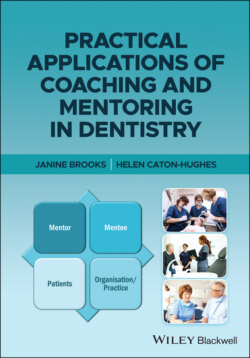Читать книгу Practical Applications of Coaching and Mentoring in Dentistry - Janine Brooks - Страница 36
The Current State of Play
ОглавлениеHaving considered mentoring in a general sense we wanted to finish the chapter thinking about the actual state of mentoring within dentistry in the UK currently. In many ways mentoring has a good level of acceptance in the profession. The term is used frequently across a wide range of settings. There are mentoring programmes for dental students set up by Dental Schools and Universities; programmes provided by Dental Corporates; programmes supported by Health Education England (HEE) and Dental Deaneries. FT's and VT's are supported by ES's who include mentoring within their role. Practitioner Advice and Support Schemes (PASS) incorporate elements of mentoring and the GDC (2019) recognises the importance of mentoring. In addition, many of the specialist societies in dentistry operate mentoring schemes. This is all good news and encouraging for the future of mentoring.
However, these encouraging signs are tempered by the often loose use and application of the terms mentor and mentoring. It seems more often to refer only to the clinical dental experience of the individual providing the mentoring. There also seems to be a closer relationship with the role of teacher than coach. At the beginning of the chapter there is an equation: Teacher + Coach = Mentor, it seems that the teacher ingredient has overshadowed the Coach ingredient in the making of mentors in dentistry.
It is disappointing that acquiring a qualification in mentoring is seen as less important. There is training given and that is positive, but often this training is short, just a few days. It takes more to become an accomplished mentor. This lack of regard for formal training seems to undervalue the real skill of mentoring beyond simply the passing on of knowledge or clinical skills. Brooks (2018) makes these points in her article; let’s get serious about mentoring.
If we as a profession and individuals do not get serious about mentoring, we run the risk of sidelining it or assuming anyone who is a dental professional can mentor any other. This type of ‘amateur’ approach will deprive everyone of the real benefits that can be gained from mentoring. A well‐trained mentor can bring more financial benefits to an organisation or practice than any new piece of kit or any new technique. Mentoring is the skill that keeps giving and growing.
